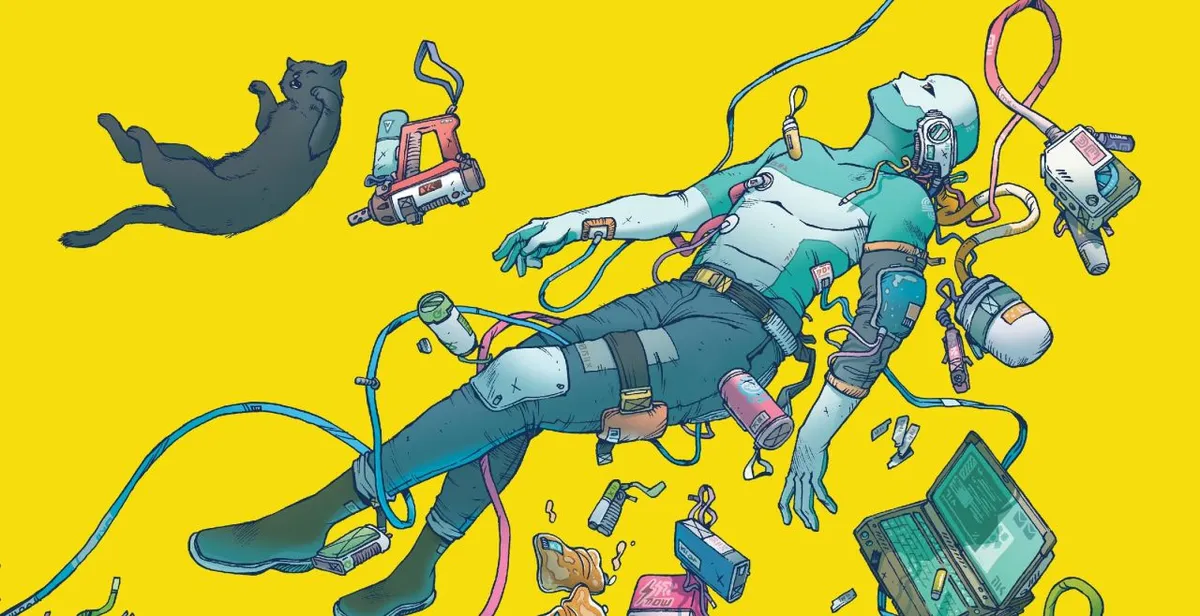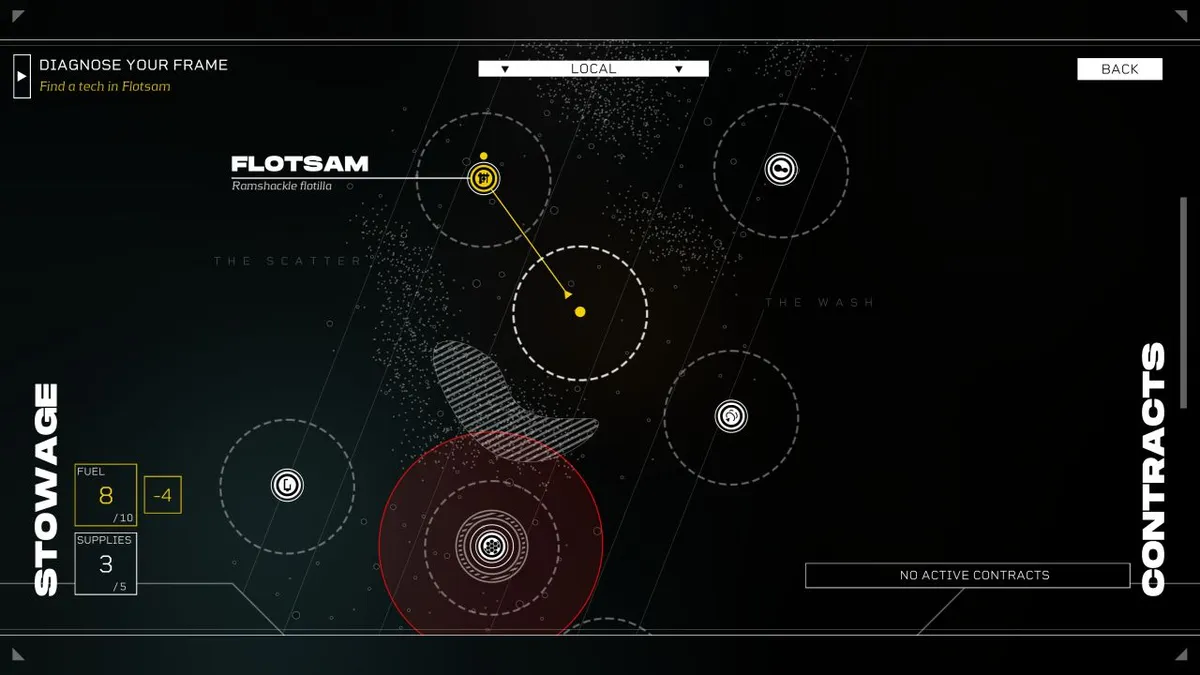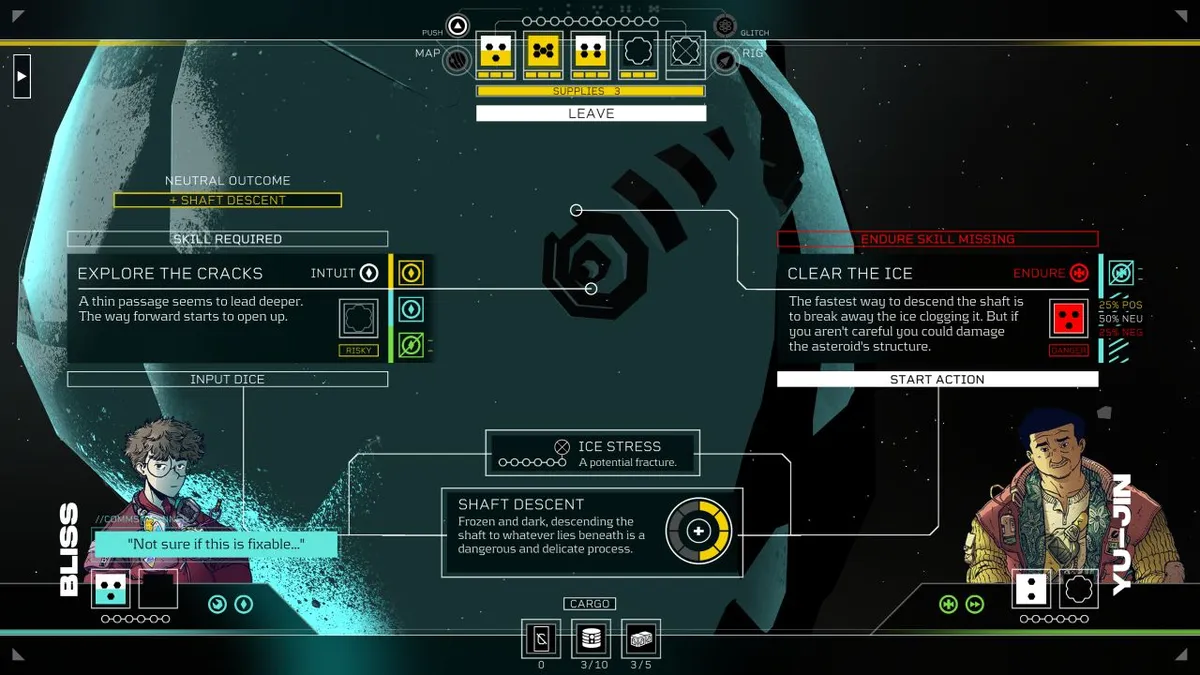Citizen Sleeper 2 review: Lost in space

In Citizen Sleeper 2: Starward Vector, the sequel to 2022's stunning sci-fi RPG from developer Jump Over the Age, your mind is not your own. From the game's start, your sleeper suffers from constant invasions into their thoughts by the crime lord Laine, who is hunting you down. At times it's nothing more than a reminder that even your brain is not your own, but other times it can stop your progress in its tracks.
The sleeper’s warring mind stands in for my experience playing Citizen Sleeper 2 as a whole. It often shows signs of growing past its excellent predecessor but is held back by the constant clashing of disparate parts failing to find harmony.
The world of Citizen Sleeper 2 endeavors to be a much grander affair than its predecessor. Whereas the 2022 title restricted you to a single location, a sprawling space station called The Eye, Citizen Sleeper 2 gives you a ship of your own and a map dotted with isolated stations to explore at your own pace. In theory this should open the possibilities for your sleeper, yet in practice the new setting of the Starward Belt feels much more rigid —and as a result— smaller.
This smallness comes from a much shorter and repetitive gameplay loop. While the cycle system is carried over from the original Citizen Sleeper, meaning you'll roll dice every morning with which to complete tasks across the map, the narrative is more episodic in nature. You, and a crew that begins with the pilot Serafin and quickly grows from there, arrive at a station, meet some locals, complete a contract linked to an NPC's story, recruit said NPC to your crew, then leave the station to do it again on the next.
While clearly influenced by the enticing promise of sci-fi stories such as Cowboy Bebop, Firefly, and Mass Effect (all of which revolve around a ragtag crew/found family falling into hijinks amongst the stars) Citizen Sleeper 2 can't quite deliver on its lofty ambitions. Each crew member feels much like the scattered stations of the Starward Belt — isolated. The intrigue of a crew focused story is the personalities you collect and how they mesh or clash in the claustrophobic setting of a dingy starship. Yet the ensemble of Citizen Sleeper 2 all live inside their own self-contained narratives that never cross over.

This is best illustrated through the new contracts. Contracts are the highlight of the sequel; missions that can last multiple cycles and require your sleeper to stock rations, fuel, as well as pick two crew members to bring along. This is a key decision as Starward Vector lets you access two extra dice per crew member while on these high stakes contracts. With the added wrinkle of classes now completely cutting off your path on the skill tree, choosing crew members to fill out your sleeper's fallings is an essential part of Starward Vector. It, along with a new stress and break system that adds a greater high risk/high reward feeling to the sometimes monotonous loop of just rolling and plugging in dice, makes Citizen Sleeper 2 feel truly dangerous at times.
Nothing feels better than barely pulling off a long contract through proper planning. perseverance, and luck. At the same time, you'll never feel more crushed than when a contract goes wrong. Yet the entire time you are on a contract your crew members will not interact with each other in any meaningful way, as if they don't even acknowledge the presence of anyone besides the sleeper. It's a disappointing shattering of the illusion that you are building and managing a crew. There is also the head-scratching decision to restrict the use of crew dice to contracts as with the amped-up difficulty of Starward Vector feels like it could be managed a little better by giving you access to extra dice at all times. It made me itch for more contracts, something that just isn't there as almost each one is tied so directly to a crew member's individual story.
As you grow your crew the illusion shatters even more. These people should not be able to live together in an enclosed space without trying to commit murder. Take Yu-Jin for example. I fucking hate Yu-Jin. He is a slimy untrustworthy freelancer that you cross paths with and can add to your crew. Yet at almost every turn in his story he lies, omits, and kind of fucks you over. Everyone in the crew should HATE this dude and yet besides a few scripted moments judging his actions you can go through the entire game without any conflict arising from Yu-Jin's presence on your ship. Of course, you can choose to reject his plea to join you but there is no real incentive for this. When it comes to the mechanical loop, you will always want more help if you can get it. But as a game so inspired by so many great stories of starship crews this feels like Citizen Sleeper 2's greatest failing.
Mass Effect 2, a game that just turned fifteen, forced players to decide between keeping either Jack or Miranda in the crew, with the option to appease both only if certain specific requirements had been met beforehand. There are no such decisions forced upon the player in Starward Vector, and that lack of conflict makes each crew member feel two-dimensional. There are some exceptions to this. A digital archeologist trying to preserve the past, a pirate radio station disseminating the truth, and another sleeper on their own journey of self-discovery all stand out as highlights of Starward Vector's narrative. Even these come with caveats though, as the constant barrage of characters across the many stations leaves each feeling underdeveloped.

This isn’t helped by the deluge of returning characters from the original Citizen Sleeper. It begins with one familiar face, but they just keep coming as the cycles go on. And while this could be done in a manner that explores how familiar faces have lived their own lives outside of our view between the first and second game, they are often given the same fanfare of a MCU cameo. These often feel like nothing more than a wink at those in the know. The exception to this is Bliss, whose story of self-acceptance and personal growth stands as perhaps the best embodiment of Starward Vector's themes of learning to accept who you were, who you are now, and who you may be tomorrow. Identity is something in flux, Starward Vector says, and to accept that is a freeing thing. But with so many supporting characters, the sleeper is often pulled along in the grand narrative in a way that takes away the feeling of choice so integral to realizing this theme. By the time credits roll, it becomes hard to feel attached to my sleeper because I've been given little in the way of true freedom to decide who I am in this world.
Citizen Sleeper was an experience defined, for me, by excellently designed tabletop-inspired mechanics that served the illusion of a player-driven narrative. No playthrough of Citizen Sleeper feels the same from person to person. But talking to those who have played Starward Vector, the opposite is true, as we are all pulled along the same beats with only small detours opening on occasion.
There is clear ambition in Starward Vector. The more complex and dangerous dice system is an example of pulling off this ambition, as contracts stand out as the high points of my time with Citizen Sleeper 2. Yet many supporting characters, the oversaturation of returning faces, and shallow engagement with the same themes as its predecessor mean the crew-based narrative fails to reach the same heights. It comes across as an overcorrection for the most prevalent criticism of the first game, that it was more a visual novel than an “actual RPG”. That can’t be said about Starward Vector thanks to contracts, but the characters that make immersing yourself in this world suffer for it as they all feel less realized than the cast of the first Citizen Sleeper.
But with the knowledge that this is the last piece of video game storytelling for Citizen Sleeper something clicks into place. Starward Vector, in all of its successes and failures, feels like a blueprint for the tabletop adaptation. Any narrative failings that stem from the lack of interaction between the crew are easily fixed by those characters being replaced by real people interacting in a tabletop setting. Keep the mechanical complexity, build your own story in the world Jump Over the Age has built for you. It’s an enticing glimpse into how Citizen Sleeper 2 can work in a different medium, but it closes the franchise’s chapter as a video game on an uneven ending.